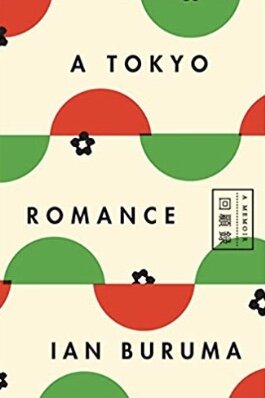A Tokyo Romance by Ian Buruma (Penguin Press)
“I never thought I could be Japanese, nor did I wish to be.” Ian Buruma, half Dutch, half English, has spent his life in Amsterdam and London, while feeling an outsider in both places. This, the man who becomes his friend and mentor when Buruma arrives in Tokyo to study film, is an asset. In Japan, Donald Ritchie tells him, a foreigner will always be a gaijin, “an outside person,” giving a “freedom that is better than belonging.” In Japan, Ritchie says, “You can make yourself into anything you want to be.”
Tokyo dazzles the twenty-three-year-old Buruma with its visual density and its propensity for change. The city he enters has been rebuilt over and over again, starting with the Western modernization during the Meiji era, then after the earthquake of 1923, and following the destruction of American bombs in 1945. Now in the mid-70s, the city still holds the changes that came with the economic boom of the 1960s. A coffeehouse called Versailles is a faithful replica of an 18th-century French drawing room, filled with people smoking cigarettes and reading comic books. Old wooden houses and the cries of street vendors carry traces of the past.
Within this “plastic-fantastic” city is an avant-garde culture that rivals any other of its time. A subculture of Tokyo artists were out to erase all externally-imposed ideas of proper behavior with creative work that is steeped in “the seedy, the obscene, the debauched, the bloody.” Araki, with his daring photographs, Mishima before he disembowled himself with a samurai sword, and the masters of Butoh made art that they called “dorukusai” or “stinking ot the earth.” Their work is shocking and invigorating and Buruma has credentials that allow him entrance to their world. He’s John Schlesinger’s nephew who came to town not long after his uncle’s tour de force, Midnight Cowboy, and Buruma himself is a passionate explorer of Japanese cinema, from yakuza gangster dramas to samurai epics to the gritty skin-flicks known as roman porno.
This leads him to an introduction to Kurosawa, the perfectionist and genius who once had a medieval castle built for a film at great expense, only to have it torn down and rebuilt because nails had been used in the original construction. Shortly before Buruma met him, Kurosawa had tried to kill himself with a razor because funding for his films had dried up, saying that apart from his movies, he didn’t exist.
But Butoh is what claims most of Buruma’s attention, the art of dance that’s based upon ancient Japanese theater and is translated in forms that are “erotic, grotesque, absurd,” with eerie and sometimes terrifying beauty. His encounter with the founder of Butoh ends when Hijikata dismisses him with “You’re a television.” His next introduction results in his brief Butoh performance in which he disgraces himself by dropping one of the dancers. “So, Buruma,” a performer observes, “you still believe in words.”
From there he ventures into the Situation Theater of Kara Juro, whose art is “as though Kabuki had been reinvented in a completely modern fashion,” a form of theater that’s political, improvisational, and wildly original. Buruma becomes the resident gaijin, with his interest in art and film--and in Kara, who fosters a form of gang culture that’s rough and sometimes violent. When a domestic altercation between Kara and his wife flares into the woman’s head nearly being smashed in with a hurled ashtray of gigantic proportions, Buruma intervenes. “So you are just an ordinary gaijin after all,” Kara tells him afterward.
And Buruma admits he is, “hovering around the edges of an exclusive world, content to remain a stranger.” As an outsider, he observes, he takes notes, and he leaves for London where he will write his first book. It is, of course, about Japan.
“Japan shaped me when the plaster was still wet,” he concludes, “Japan was the making of me.” How his romance with Tokyo led to his career as a writer is a story that he tells with honesty and insight. It’s one that should be read by any aspiring expatriate, whether they follow Buruma to Tokyo or go off to explore their own romance.~Janet Brown
